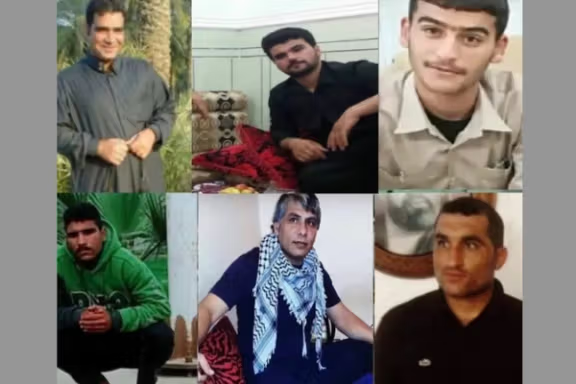On September 28, the United States deported a planeload of Iranians to Tehran in one of the Trump era's most controversial migrant return flights yet, to a country with severe rights concerns with which it has no diplomatic ties.
The plane, carrying 120 Iranians including three women, landed in Iran on September 29, according to the deportee speaking on condition of anonymity.
Abolfazl Mehrabadi, the acting head of Iran’s interests section in Washington DC, told the deportees at the departure airport that almost 2,500 other Iranians were in US immigration custody and were expected to be returned to Iran on special flights, according to the deportee.
The figure is far higher than what an Iranian Foreign Ministry director general reported on Tuesday. Hossein Noushabadi said the US immigration authorities intended to return nearly 400 Iranians to Iran.
US federal sources told Fox News on June 28 this year that Immigration and Customs Enforcement (ICE) officers had detained 130 Iranian nationals in various parts of the country within one week.
According to the sources cited by Fox, with the new arrests the number of Iranian citizens in ICE detention facilities had reached 670 at that time.
The network, citing the US Department of Homeland Security, reported ICE had detained 11 Iranian nationals in eight states, one of whom was a former member of the Revolutionary Guards who, according to the officials, admitted to links with Hezbollah.
No asylum rights
The deported Iranian speaking to Iran International painted a grim picture of life inside US detention centers.
“The conditions were very harsh. For five months I requested treatment for a stomach problem but was ignored. Diabetic patients or those with mental health issues were not given proper medication or food."
"The most they gave was simple medicine such as Tylenol (acetaminophen) or ibuprofen. Even for severe colds they only gave one Mucinex pill.”
According to the deportee, the way detainees were transferred was also extremely harsh: “They chained us together with handcuffs and shackles, and we sat like that for hours without water or access to toilets. No attention was paid to our basic human needs.”
“Husbands and wives were separated, even children born in the US were taken from their parents. Many of us had not even appeared before an immigration court. My own case was in the appeals stage, but no attention was given.”
Refugee conventions
Ali Herischi, an immigration lawyer in Washington DC area, told Iran International: “At the beginning of Mr. Trump’s presidency, it was announced that the United States would no longer accept asylum applications at the border, which is against international refugee treaties."
"They should have been given the right to present their defense, a process that has now been completely eliminated.”
Herischi pointed out that lawsuits have been filed against this process, adding that although in some states such as Texas the order has been blocked, plaintiffs still have not been able to obtain a final ruling to completely stop the enforcement of Trump’s directive.
According to Herischi, asylum seekers are given only a 10-minute hearing in court, although if they say they would be tortured upon return to Iran they would not be deported there but to another country and have no right to appeal.
Herischi said some asylum seekers have been held in prison for months, including some who are Christian converts.
The Iranian citizen deported from the US expressed surprise at the unusual cooperation between Tehran and Washington in carrying out the deportation.
“Had the Iranian government not agreed to a charter flight, the US could not have forced us back. Normally, for those with travel documents, they bought regular airline tickets. But once the charter flight was arranged, even those who didn’t want to return were forced onto it.”
He said: “If there had been no charter flight, many of us could have resisted. But they dragged us in chains on the officers’ shoulders and forced us into the seats.”
'Shocking' scenes
The Iranian asylum seeker recalled “shocking” scenes before the flight: “One detainee, in order not to return to Iran, slit his wrist with a razor and swallowed dozens of pills."
"Officers carried him on a stretcher while he was convulsing. Another cut his hands, but they just bandaged him and forced him on the same flight back to Iran.”
The flight started in Alexandria, Louisiana, he added, then stopped in Puerto Rico and Egypt before finally landing at a military base in Qatar: “There, Qatari officers used electric stun guns and force to put us on the Iranian plane. They dragged those who resisted on the ground, cursing and shoving them onto the plane.”
Fear, then surprise in Iran
The Iranian deportee said all deportees on this flight returned to Iran with fear of how the Islamic Republic would treat them: “We thought we would be treated very badly, but contrary to expectations the behavior was respectful."
"The Revolutionary Guards intelligence handed us confidential interrogation forms to write the reasons for our stay in the US, then returned our documents and passports, and even arranged free taxis and bus tickets for those who had no money or family.”
He added: “This behavior shocked us at first. Many of us thought we would be arrested, but it did not happen.”
Herischi, however, said that in past cases, Tehran authorities “certainly” follow up eventually with deported asylum seekers.












